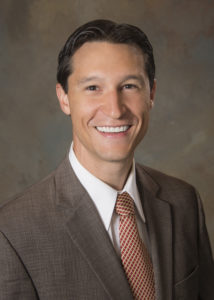Alumni Profile: Meet Joel Massey
October 10, 2019 • Uncategorized
 Joel G. Massey, MD, MPH, CPH, C-TropMed, is Regional Medical Director for the Texas Department of State Health Services (DSHS) Public Health Region 2/3. He is a Spring 2019 graduate of the UNT Health Science Center MPH Professional Option degree program.
Joel G. Massey, MD, MPH, CPH, C-TropMed, is Regional Medical Director for the Texas Department of State Health Services (DSHS) Public Health Region 2/3. He is a Spring 2019 graduate of the UNT Health Science Center MPH Professional Option degree program.
Dr. Massey began his career as a family physician in the U.S. Air Force. After his military service, he became interested in public health and joined the CDC’s Epidemic Intelligence Service.
He followed up this experience with a preventive medicine residency at the Texas Department of State Health Services in Austin, where he concurrently completed his MPH at UNTHSC. That training led Dr. Massey to his current role with the Texas DSHS PHR 2/3 office, based in Arlington.
The Texas DSHS Public Health Region 2/3 includes 49 counties in North Texas. Texas DSHS provides public health services for 37 of these counties that do not have their own local health department.
Dr. Massey directs services in several field offices, overseeing areas like case management for persons with specialized health service needs, epidemiologic surveillance, child and adult immunizations, maternal-child health and safety programs, restaurant sanitation, sexually transmitted infection treatment and prevention, tuberculosis control and tobacco prevention. He also collaborates with stakeholders to build community partnerships and promote a “health-in-all-policies” strategy toward the vision of a healthy Texas.
What did Dr. Massey find most valuable about his experience at the UNTHSC College of Public Health?
“Through the online curriculum I studied theories of behavior change that underpin evidence-based public health interventions, and I also learned how public health policy can limit or create health care access, make the healthy choice the default choice, and shape the built environment to promote desirable health outcomes,” he says. “Inter-action with my colleagues, professors and students throughout the courses provided perspective on how to collaborate and develop health strategies that address equity and inclusion of diverse community health needs.”
Dr. Massey says he became interested in a public health degree and decided on UNTHSC because he “wanted to practice medicine outside the four walls of an exam room,” to have a larger impact on the health of his community.
“Preventive medicine, epidemiology and policy are cornerstones of the practice of public health. The flexibility of UNTHSC’s online professional curriculum was an ideal match for my training and education goals, and afforded me opportunities to network with colleagues who would eventually be partners in public health practice in North Texas,” he says. “The path I took toward my present position included a calculated trajectory though the UNT system in order to be an effective local public health leader in North Texas.”
What does Dr. Massey find most challenging and most exciting about the work he is doing now?
“Preparing communities for health threats and navigating disparate views on prevention activities (like immunizations) requires an unflagging optimism and respectful but firm commitment to the principles of evidence-based public health practice,” he says. “Professionally, it is very rewarding to work together with stakeholders who passionately share this commitment, but can be draining personally. I like to recharge by enjoying healthy outdoor activity with my family, which motivates me to prescribe the same energizing medicine for the population in the communities I serve.”
His advice for current public health students preparing for their own careers?
“I encourage students to look for local opportunities to be involved in public health. Advocate for a ‘health-in-all-policies’ approach among your community leaders,” he says. “Whether you are promoting physical activity among older adults, researching effective youth anti-nicotine messaging, or lowering barriers for persons with disabilities in your community to be prepared for a disaster, you can make a difference and discover a passion for public health even before you achieve your degree. Don’t neglect the opportunity to build your professional network along the way—public health is a team effort, and we are more effective through collaboration than we are in silos of distinct disciplines.”


Social media